

Milena Pawlik sur Twitter : "5 Crazy Ways Social Media Is Changing Your Brain Right Now Take a look! This is so good! □... Social Consequences of Internet Use. Funny-news-11-week-13.jpg (JPEG Image, 500 × 293 pixels) 5 Crazy Ways Social Media Is Changing Your Brain Right Now. One size does not fit all, CPD in a modern school. Published on April 27th, 2015 | by Mark Anderson One of great things about teaching is that each year the page resets itself.
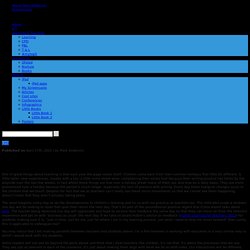
Children come back from their summer holidays that little bit different. A little taller, new experiences, maybe with a tan, a little more street-wise, complaining their wrists hurt because their writing practice has fallen by the wayside over the last few weeks. In fact whilst these things are true over a holiday break many of them are also true on a daily basis. They are more pronounced over a holiday because the period is much longer, especially the lack of practice with writing.
The reset happens every day as do the developments to children’s learning and for us with our practice as teachers too. You may notice that I am making parallels between teachers and students above. Some readers will not see far beyond the point above and think that I treat teachers like children. Let’s take delivery (be it as lesson or an INSET session) as an example. Mark Anderson sur Twitter : "New post: One size does not fit all, CPD in a modern school inc @informed_edu @kevbartle.
Mark Anderson sur Twitter : "Create excellence framework at #EOS2GETHER... FutureLearn — Learning for Life. Open access to outstanding advances in life science and biomedicine. Social Media- Sucking Time or Saving Lives: Kristen Howerton at TEDxChapmanU. Mark Anderson sur Twitter : "Press Ctrl (or CMD on Mac) + Shift + T to reopen a closed tab in Chrome #lessonhacks #edtech #edtechchat.
Flipped classroom 2.0. Learning Published on May 24th, 2014 | by Mark Anderson I’ve been a big fan and supporter of flipped learning for a long time.
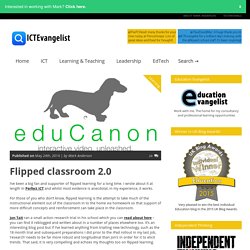
I wrote about it at length in Perfect ICT and whilst most evidence is anecdotal, in my experience, it works. For those of you who don’t know, flipped learning is the attempt to take much of the instructional element out of the classroom in to the home via homework so that support of more difficult concepts and reinforcement can take place in the classroom. Jon Tait ran a small action research trial in his school which you can read about here – you can find it reblogged and written about in a number of places elsewhere too. For me, I like to include accountability and tracking with things that I do. With that in mind, when Michael Ha recently showed me in our AppSmashLive a tool he found called EduCanon I have to admit, I got somewhat excited. The interface is really very simple to use. This in my mind would work like this. Here’s what it looks like when being used…
10 honest Facebook notifications we all need. ICT and LEARNING STYLES. Free Technology for Teachers. On Chat vs In Person. Facebook and Employers. Top tips: Social media. Is Facebook Making Us Lonely? - Stephen Marche. Yvette Vickers, a former Playboy playmate and B-movie star, best known for her role in Attack of the 50 Foot Woman, would have been 83 last August, but nobody knows exactly how old she was when she died.
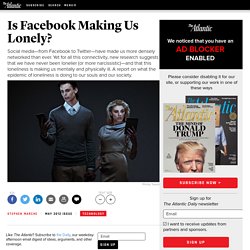
According to the Los Angeles coroner’s report, she lay dead for the better part of a year before a neighbor and fellow actress, a woman named Susan Savage, noticed cobwebs and yellowing letters in her mailbox, reached through a broken window to unlock the door, and pushed her way through the piles of junk mail and mounds of clothing that barricaded the house. Upstairs, she found Vickers’s body, mummified, near a heater that was still running. Her computer was on too, its glow permeating the empty space. The Los Angeles Times posted a story headlined “Mummified Body of Former Playboy Playmate Yvette Vickers Found in Her Benedict Canyon Home,” which quickly went viral.
Also see: Live Chat With Stephen Marche The author will be online at 3 p.m. The A to Z of Social Media for Academia. Digital literacy. Digital Literacy: Professional Development Resource. This resource is designed to support primary and secondary teachers to integrate the development of students’ digital literacy into everyday learning.
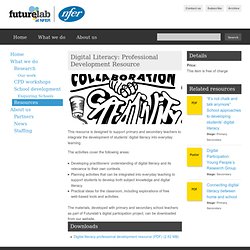
The activities cover the following areas: Developing practitioners’ understanding of digital literacy and its relevance to their own contexts.Planning activities that can be integrated into everyday teaching to support students to develop both subject knowledge and digital literacy.Practical ideas for the classroom, including explorations of free web-based tools and activities. The materials, developed with primary and secondary school teachers as part of Futurelab’s digital participation project, can be downloaded from our website. Resources for Teaching Digital Literacy. Search Tools Search is the essential 21st century skill.
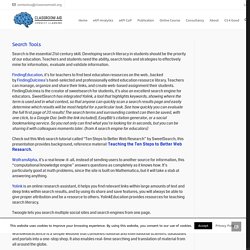
Developing search literacy in students should be the priority of our education. Teachers and students need the ability, search tools and strategies to effectively mine for information, evaluate and validate information. FindingEducation, it’s for teachers to find best education resources on the web , backed by FindingDulcinea’s hand-selected and professionally edited education resource library.
Sonia Livingstone: Digital Media and Children’s Rights. The following post was adapted from a lecture given by Sonia Livingstone at the Palais des Nations, Geneva, on 12 September 2014, at a United Nations Day of General Discussion of the Committee on the Rights of the Child.
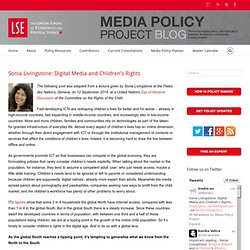
Fast-developing ICTs are reshaping children’s lives for better and for worse – already in high-income countries, fast expanding in middle-income countries, and increasingly also in low-income countries. More and more children, families and communities rely on technologies as part of the taken-for-granted infrastructure of everyday life. Almost every aspect of children’s lives has an online dimension, whether through their direct engagement with ICT or through the institutional management of contents or services that affect the conditions of children’s lives. Indeed, it is becoming hard to draw the line between offline and online.
ITU figures show that some 3 in 4 households the global North have internet access, compared with less than 1 in 4 in the global South. Educational Technology and Mobile Learning: Don't Miss These Google Resources and Lesson Plans for Teaching Digital Citizenship. September 25 , 2014Google Digital Literacy and Citizenship Curriculum is a great resource from Google to help teachers educate their students on the importance of digital citizenship and the different ways and strategies to use to keep themselves safe while using the net.
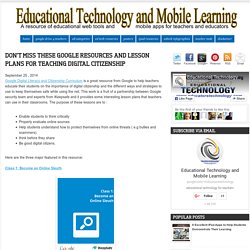
This work is a fruit of a partnership between Google security team and experts from iKeepsafe and it provides some interesting lesson plans that teachers can use in their classrooms. The purpose of these lessons are to : Enable students to think critically Properly evaluate online sourcesHelp students understand how to protect themselves from online threats ( e.g bullies and scammers).think before they shareBe good digital citizens. Here are the three major featured in this resource: Ictwork - This is a blog for exercises at school. Del og bruk - Hva er og hvordan bruke Twitter? How important is Twitter in your Personal Learning Network? Twitter and the Personal Learning Network (PLN).
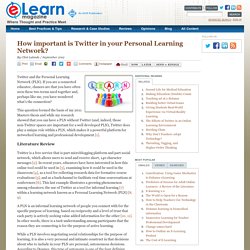
If you are a connected educator, chances are that you have often seen these two terms used together and, perhaps like me, you have wondered what's the connection? How We Use Social Media, Illustrated. Rebecca MacKinnon: Let's take back the Internet!